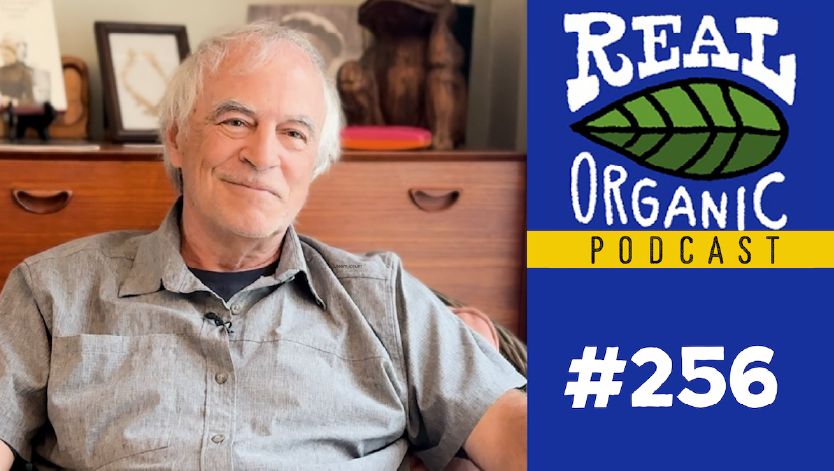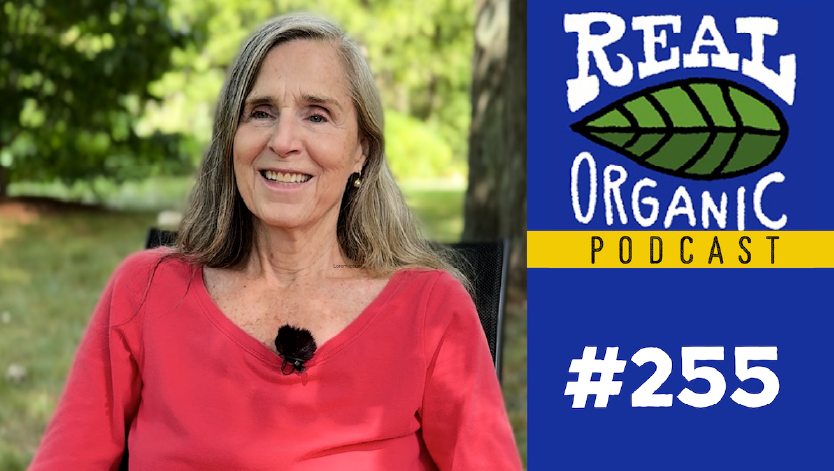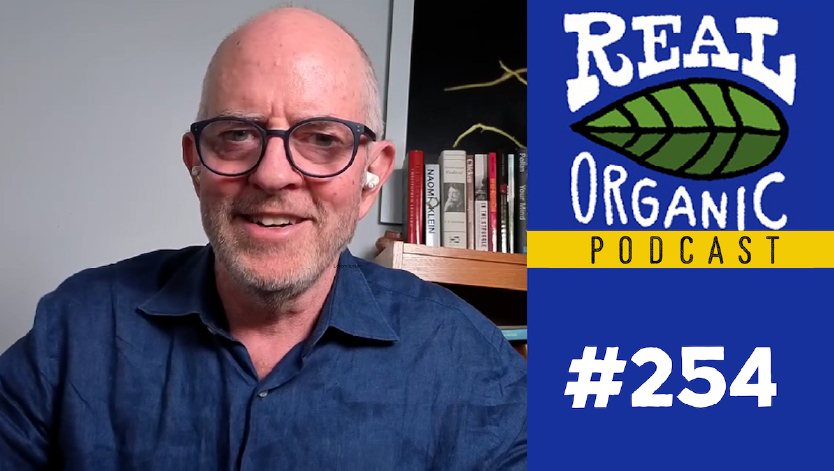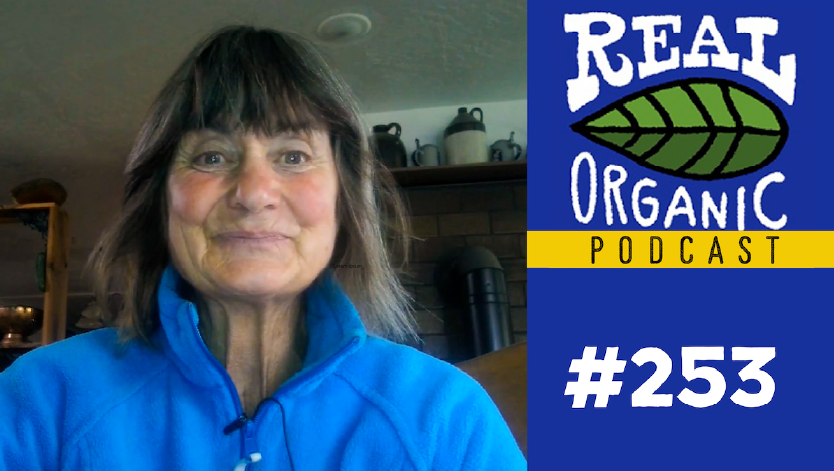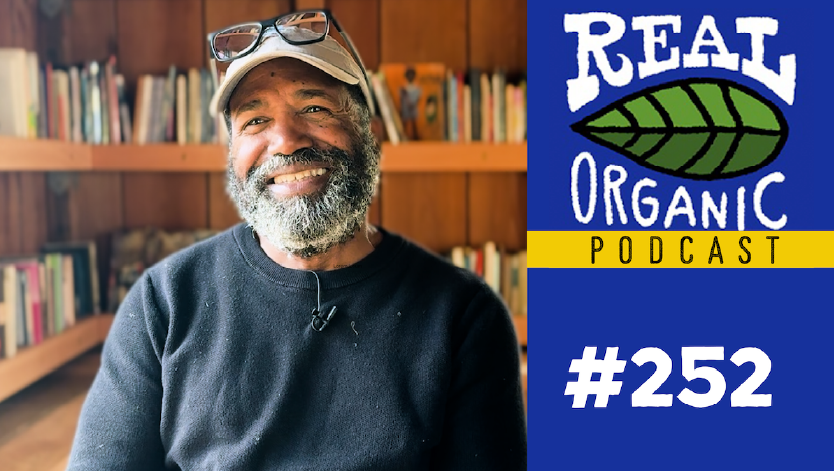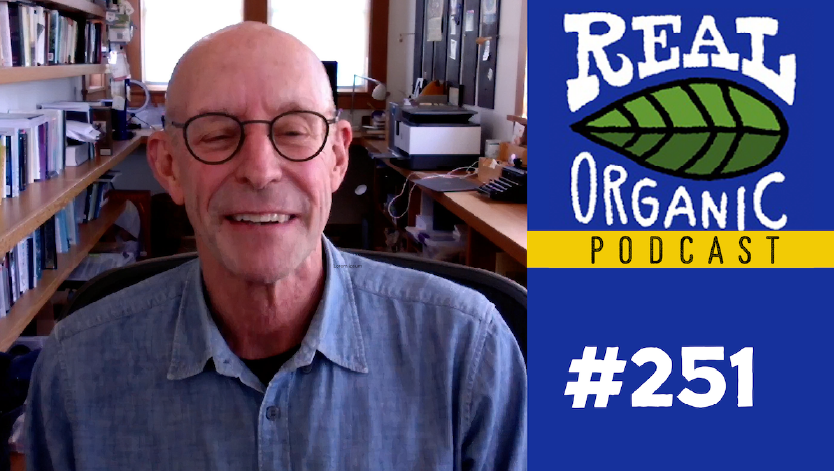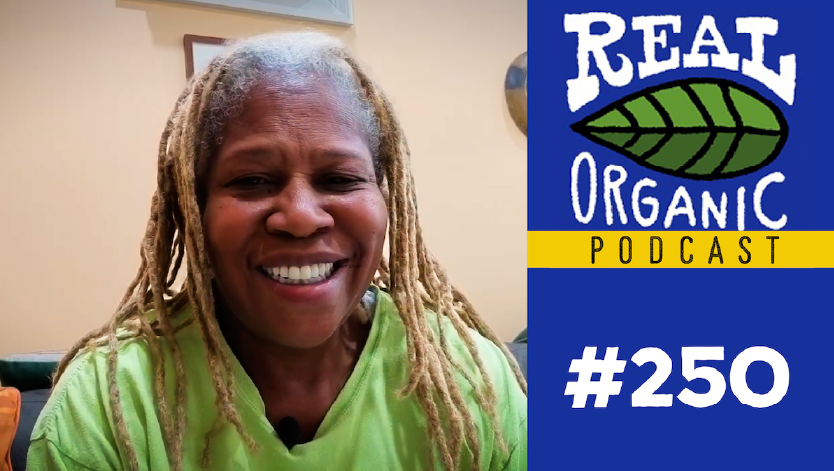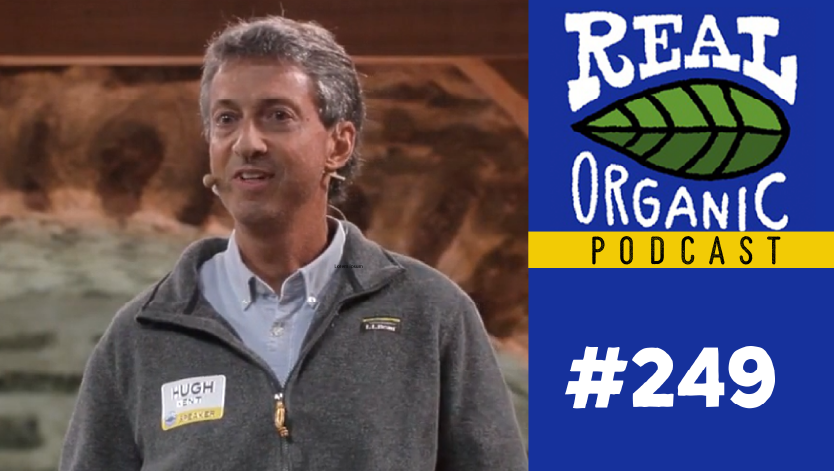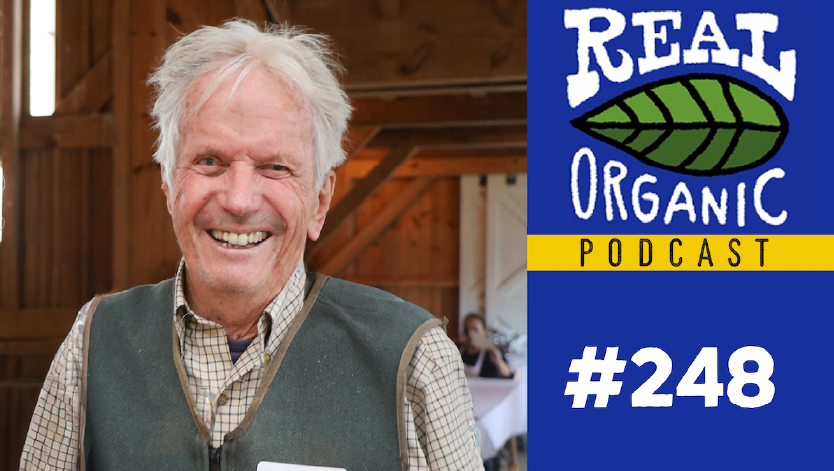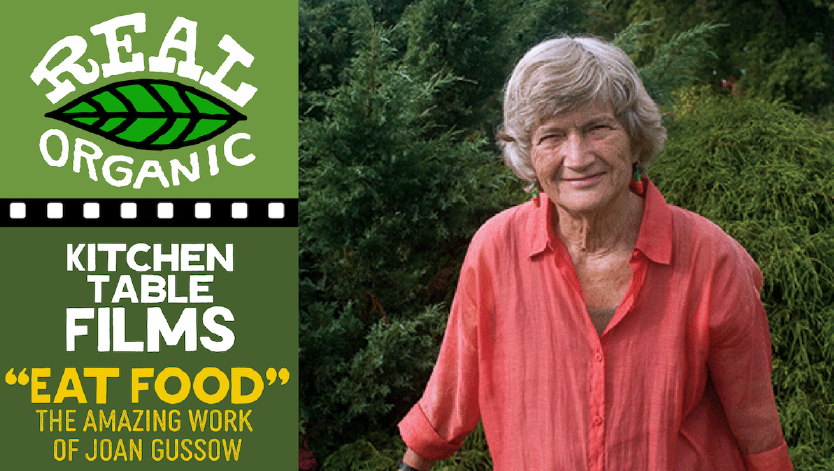Episode #195
Linley Dixon At Churchtown: 2024 Farmer Uprising
Welcome! You can subscribe and download episodes of our show through your favorite podcast app.
You can also subscribe to receive the video version of each episode on our YouTube channel.
Linley Dixon’s talk has been edited for clarity and readability.
Linley Dixon delivers her talk “Farmer Uprising” to the crowd gathered at Churchtown Dairy on September 28, 2024, for Real Organic: A World Movement:
Linley Dixon 0:00
If you’re left, you’re incredibly passionate. If you know me at all, I’m an incredibly passionate person, and I just believe with my whole heart, that the group of people that have joined this movement (and you sitting here right right now, you’re part of this movement) we need to be listened to and we need to be supported, because I know we have the answers. We have the answers to all the problems that are plaguing us, and somehow we just need support to go out and do it. And so yesterday, when the farmers gathered to talk about, you know, how do we grow this movement out? I get really overwhelmed, because there’s times when I feel like all the weight is on my shoulders, and I have to run out and do everything myself, and that’s suggested in the circles. And Nora, if you didn’t tell from her presentation, is incredibly wise, and she always says the right thing when I start to panic. And yesterday, she said you don’t have to do all of those things. She said there’s so many organizations out there doing so much. You should do and focus on what is unique about you, and what that is, it’s the people, the people that are in this movement. There is no other movement in the world like the people in the organic movement and the real organic movement. They are so inspirational. I am so privileged to be part of this, whatever this is, this movement, and I think that’s what distinguishes us from every other label that you see out there. We’ve created a label, yes, but the people behind this label are, you know, we could get rid of the label tomorrow, and this movement would persist. It’s not about the brand, it’s about who’s behind it. So I’m opening with John Kenny, who I didn’t know was going to be here, and of course, he’s here. And I got an email one day and he said, organic has done a lot for me. It’s been a friend, a buoy, a partner and a family. Perhaps, right now, it needs me more than I need it, and I’m happy to accept that. When my son asks me where I was when the USDA was trying to roll back organic, I’ll be able to tell him “Right on the front line.” And I got chills when I read that he actually wrote a whole essay, and that was the last sentence, and I just got chills up and down my spine, because there are so many people that are here. They’re part of this movement, and they don’t need the label, just like it was 50 years ago. They just believe in it. My talk today is going to be focused on the people, because the people, and Nora, you know, called it, they’re what makes us unique. So in the pilot year, I met a farmer named Mark Kane, and his farm is absolutely gorgeous. The farmers live on the farm. They do yoga together, they eat meals together, and they work really, really hard together. And in my farming journey, I forgot to do the yoga and I forgot to just take care and eat well. And so it was so important that he brought that. He knew that farming was more than just the food, and so this is one of my favorite quotes. I think some of you read it because you’re already giggling. “I didn’t want to reach the end of my life and just say, Wow, that was a lot of farming.” And for sure, every farmer feels that way. They’re like, why am I working so hard when I could go to the grocery store and get some cucumbers? It’s because my cucumbers taste so much better. They are not the same thing, right? So we all want to be part of something that’s bigger than our farm, that makes it so that all the cucumbers taste like our cucumbers. That’s what’s in the store. And we can’t do that in isolation. We have to do that together. So Dru Rivers is the woman who drew the heart in the sand, Paul’s partner. When I met her, she couldn’t understand why we were talking about other words, right? Why are we the Real Organic Project? Well, it’s because of people like Dru and lots of farmers who just said organic. “That’s what we are. Every fiber of my body for the last four decades has been devoted to that word organic. It’s truly my life, my spirituality, my every breath. I’m a bit boring, really.” She was joking, because she is one of the most entertaining people in the world. One of her stories is that she’s gone to farmers market for 40 years, at least. I don’t know the exact number, but basically for a lifetime, every single week, maybe when she was delivering once, she might have missed a farmers market, but… two? she missed two. So, she has to load up a truck and it’s dark at three in the morning and drive it a couple hours. And instead of just being groggy and tired and annoyed that this was what she had to do every week, she still goes and she looks up at the sky and celebrates, because it’s always clear sky in the middle of California summers and in awe of the beauty and the privilege to be alone in this moment, bringing a big pile of food, to people to eat it. And so I try to channel the wisdom of these stories that I’ve learned on the road of the passion and live this out. But these are the farmers that we are trying to support and replicate. Another Full Belly woman who really influenced me was Judith Redmond. Our goal wasn’t to have a successful business or even make money and have work life balance. Our goal was to save the world through organic farming. And so, Nora also touched on this too. We’re not just promoting Real Organic farmers here. The passion that the organic farmers feel we are trying to save the world. We have the answers. We can do this. So this goes so much more beyond a label and just a few farmers that are part of that label, we truly can save the world if we support this way of farming. And getting to organic certification is a journey. I have my own origin farm story as a first generation farmer, it was very confusing to figure out if I could call myself organic, even though I was farming organically, right? The USDA owns that word, and what a relief to hear that IFOAM has come out and said, of course, you’re organic. It’s a journey to certification. So I’m going to encourage all the startup farmers, you’re an organic farmer. Okay? So you can’t put the label on your product at the market stand, but you’re farming organically, and it’s a journey, and if you need certification to get your product sold, we’re going to help you along the way, survive. I have a 1000, well more than that, every farm that we’ve certified has stories upon stories, and I just plucked a few for today, and I promise I won’t go too long in telling them all. But there are so many stories like this, of people that can inspire the future. The Ask A guards are an incredible family farm. So this is wheat that was just harvested, harvested, and there’s already a crop of clover growing up. Yesterday, Scott Park was talking about what he calls, ah it started with a T, tillage, targeted tillage. Yeah? And I’ve been calling it intelligent tillage. The farmers out there who are growing their own fertility, sometimes have 14 year crop rotations, seven year crop rotations. Sometimes their fertility goes down a little bit in that crop rotation, only to bump it back up by growing large biomass. Sometimes they need tillage. Please go out and spread the word that no-till is not climate smart if you’re using synthetic fertilizers and herbicides to do it, because the USDA does not know that. They don’t know that, and they are funding that kind of agriculture as climate smart. All of that money should be going towards organic farming. This is the only kind of farming that is climate smart. This is working so well for them that when I, so Mark has been able to include his daughter in the business. And now two families are being supported by about 1000 acres of grain. When I visited them the second time, their entire farm had been wiped out by hail. And I said, the farmer that I just come from, they had insurance, no problem. They were also using a lot of biological inputs, spraying them, you know, over the farm and stuff, to get some kind of protection or increased fertility. And I went to Mark, and I said, Do you use any of those sprays or inputs to get enhanced biology on your farm? And he said, No. And so the other farm had hail insurance, because it hit him too. And I said, Do you have hail insurance? He said, No, my diversity, my farm diversity, is my insurance. And the fact that I don’t have any inputs is the second thing, because I’ve hardly put any money into this field, and so, yeah, it hurts, you know, I lost this, this production in this moment. But he’s looking at the long term, and he’s saying, I’m going to come back. You know, it’s not a problem. We’ll be just fine.
Linley Dixon 9:59
So not putting a lot of money in means you’re so much more resilient, and you don’t need external checks coming off the farm either. So I put this photo here because the Aska guards are using our label. They process all of their grains on their farm, and they sell with their own farm name, and they do not need the Real Organic Project label to sell their product, but they are hand stickering on all of their bags the Real Organic Project sticker because they are so proud to be part of this movement, and they recognize that sometime down the road, or maybe even now, if they build up, you know what this label stands for, that it will help keep shelf space, maybe for their own farm as consolidation comes into grain, but maybe for the next farmer too, who might want to enter the market that the Real Organic Project only means something if we do this together. They also get their product into school lunches, and I just want to reiterate this, because my daughter’s an incredible athlete, and she won’t eat the school lunches, and they just don’t taste good to her. And I would be so proud to have my daughter eat this lunch with ask a guard grain there. So that is a huge part of what we need to do moving forward. They also give back. So this is Mark and Beth educating at the same school where the kids are then going to go eat the food. And so even if this is new and different food, if they’ve just heard the farmer talk about, you know, everything that they do and the life on the farm, the kid is so much more likely to go try that healthy einkorn or whatever is a different product for them, muffin, because they’ve met the farmers. So giving back to the community is so much a part of our movement. I’m going to read this one for a second…because it’s emotional. So there’s endless stories of farmers giving back to the community in this movement. Paul Bickford is the man in the back there. He wanted to pass his farm on to the next generation, but no one in his family wanted to farm. Instead of waiting for his farm to go up for sale, when he retired, he proactively put out a Craigslist ad. It read, “I am seeking a forward-thinking individual or couple to join my 950 acre organic farming operation, ethics and trust are a cornerstone of organic farming and are important to me. I want to share my 40 years of farm experience with someone who is willing to work to improve my farm.” John and Hallie weffking answered that ad. At the time, they were running a restaurant in Wisconsin, but they really wanted to farm, and they didn’t have access to land, equipment and infrastructure to support their farming dreams. Paul took them in and taught them all he knew. He died unexpectedly a year ago at only 69 but instead of his farm becoming a housing development, John and Hallie are still farming there. Paul was a tireless advocate for organic farming and fostering the next generation of farmers. He served on Wisconsin’s Organic Advisory Council and on the USDA Advisory Committee on Beginning Farmers and Ranchers. He was known for saying, you can teach skills, but you can’t teach Nice. These are the stories of the Real Organic Project, and they need to be told, because they will inspire generosity in others.
Linley Dixon 13:38
When I visited Nora in Germany to learn about how a farmer-led association like Naturland works, we visited dairy farmers south of Munich who got dressed up in their firefighting equipment to show us how proud they were of their service to their community. So this is what we do. We give back. We give back in teaching the next generation how to farm. We give back to our communities in teaching them at schools. We give back to them in, in things like joining the firefighting. The other thing that we’re doing that’s really unique at the Real Organic Project, is this is a quote from Nora, she said, “Organic is addressing who holds the power in the food system and in supply chains.” And sometimes this is hard to do. It’s really hard to speak out against great money and power. And I’ve been using this image of a lone bird on a wire. And sometimes it’s really hard to be the only bird on the wire. And you know, of course, you have some…someone has to be first, and then others join in. And I see that’s what the Real Organic Project is doing. We’re telling the truth, and that’s not always easy, but I know others are going to join us, because it’s the truth. And we have to tell the truth because, this is Mark Squire, he said, “Most people, and especially young people, don’t realize how much effort went into making organic what it was, and so they only see organic now for the industrialization.” And I have to say that’s a lot of what I saw, too, and I was confused about it, but, but he has an independent grocery store, and a lot of the reason why Mark ascogard is able to sell his grain is because of all the independent grocery stores in the Minneapolis-St Paul area. This is something we need to replicate. We need to do better. Mark Squire told a story about how he took one of the best selling things in his store and pulled it off the shelf because fair labor practices were bad with that brand. He wasn’t afraid to do that. And instead of, you know, he was like, Okay, talk to everybody in the store. And said, people are going to complain. They’re not going to find their favorite chips anymore. And instead of complaining, it was really progressive in California, they said, Thank you for taking care of us. They didn’t know that that was happening, right? So we need more stores like the Good Earth.
Linley Dixon 16:07
Alternative labels really have set back change in the food system. So something that’s really hard to talk about, something that has some good to it, which is a Non GMO Project. Of course, GMOs right now are being used for a ridiculous amount of spraying of glyphosate and other herbicides. I’m afraid that the Non GMO Project has pulled away a lot of market value from organic, and we need to stop prioritizing non GMO over organic. That Non GMO Project, stuff that’s in there, there’s a monarch butterfly on the label, and stuff that is in that product was using insecticides and herbicides that are killing that monarch label, or that monarch on the label. So, sometimes we have to say really hard truths. Of course, it’s a good thing not to have GMOs, but please make sure that your products that you’re buying, if this matters to you, are organic. Right now, if you poll customers, non GMO is more important than organic. These are all the things that the generation before us were called when they said the word organic, hoity-toity, elitist, crazy. You’re a liar. It’s fake. It’s not real, right? It’s not really working. It’s not scientific. Voodoo agriculture is what Dru was told. But the worst is dangerous, right? So they try to undermine you, as you know, following in the footsteps of people that came before me doing this. This is what’s affiliated with organic now. For sure, of course, we get a little bit of that old stuff, but for the most part: principled, fearless, revolutionary, high integrity, hardworking. Continuous improvement, that’s a big one. That is a principle of our movement, is that…so the USDA is down here, and the Real Organic farmers have gone so much far beyond that because of this, this concept of continuous improvement, it’s actually written into the law. That’s what the sunset rule was all about, right Alexis? The sunset rule was meant to like, Okay, we need this safer input now, but it’s got to go in five years. So figure out an alternative. And that national list of allowed synthetics in organic that was only meant to be a supplement for when one of the systems had fallen apart. It wasn’t meant to be the whole system. You know, you weren’t meant to design your system around needing that fertility the entire time. Maybe you need it because your transplants, it’s raining a lot out. You need to fertilize your transplants once before you get them in the field. That’s what the national list is for. Dave Mortensen taught us that herbicide use has increased 70% in soybean just in the last 10 years. Due to glyphosate resistance there’s an increased use of two, 4d, and this is a really nasty herbicide, dicamba, because it’s increased 16 fold, but it actually spreads. I mean, we now have glyphosate in the rain, so I don’t want to say that it’s even worse, but all of these things are bad. You know, we have a glyphosate-free label now. That’s just ridiculous, because they’re just using a different one of these herbicides. This is really problematic for organic growers, he says, Because dicamba is very volatile, and I’ve seen people spraying it in the middle of the day, so they’re not using it right, so it’s drifting all over the place. So this is a really common picture of modern day agriculture. I saw stuff like this all the time when I was traveling in the field. The erosion here, it’s occurring because the rainwater isn’t being absorbed by the soil. Why isn’t the rainwater being absorbed by the soil? Because there’s no organic matter in it. There’s no living roots. And sometimes with this no-till stuff, people don’t know how to cover crop, right? So they might even have a cover crop, but they’re tilling it under in the spring, when it’s this big, because it’s time to plant. So it’s and, you know, this is what we’re, we’re giving money to them so that we have to figure out a way to just like, Okay, you’re using a cover crop, but can organic share their knowledge and how to do this? Because we’ve been doing this for decades. You know, you really do need to get biomass for it to even be effective. Otherwise, don’t waste your time. But what’s happening here? This is gully erosion. And I, on the road, I saw gully erosion over my head. This is what the Midwest looks like. The vast majority. You’re just losing the soil. So without any organic matter, you no longer have all of those fungi and bacteria and calendula and nematodes and endophytes, you know, mycorrhizae, all these amazing things. You can’t list them all. They’re not in the soil. And when they’re not in the soil, the water runs off the soil, and then it goes into the waterways, and the waterways are affected all the way down to the ocean. This just has to stop. And I can’t tell you how beautiful it was when I was driving and I would see mile after mile of soil like this, and I would arrive to the Real Organic farm that I’m inspecting, and all of a sudden it was green, right? We know what we’re doing. We have the answers. Francis Thicke says cows were meant to walk about and grass was meant to stay in place. We’ve made a system that does the opposite. How idiotic do we have to be? And it completely depends on fossil fuels in order to make this, to pull the system off, right? I just want to go back for a second, because Francis wasn’t here, but he was going to do an incredible breakout. He’s the one that taught me that the timing of, you know, you think just putting animals on pasture, you’ve got it right? He has 60 different paddocks that he’s rotating the animals through, and you time it so that, you know, the cows are on the pasture right when it’s about halfway up. And in the springtime, the whole, the whole pasture is ready at once. And so that’s when you hay, you don’t get a ton of animals for that time, right? And then during the drier times, you actually speed up your rotations, because there’s not as much there. And, you know, there’s so many things. Oh, yeah, the reintroduction of the cattle. You want to do it before that grass starts to lignify and go up to seed, because at that point it’s like halfway up. So when the first grazing comes, the roots are gone, right? They totally die back. And so then they’ve flushed out, and they’re starting to grow even more leaves. And the timing of it is so important, because if it goes past lingification and going to a seed head, then you don’t maximize your carbon sequestration. So you’re trying to keep the grass in that perpetual state of producing new leaves. And this knowledge is unique to every place. So that’s why it’s so important that Francis, well, he’s not here because he’s selling his farm that he teaches that next generation how to do this in that spot. Jonga Sao said, cows can get as much nutrition from one acre of well managed pasture as they can from an acre of corn. Just sit with that. Did anybody know that? That is an astonishing fact. What the heck are we doing growing corn and using all those fossil fuels when the cow is getting just as much nutrition from well managed pasture? It’s outrageous. We should all be outraged. Kristin Kimball says farms produce what people will buy. If you don’t eat the food from farms like ours (and this was important) make it the mainstay of your diet and not just the garnish. We simply won’t exist. And this actually involves work on the Eaters’ parts. It’s a lifestyle change. Real change occurs from the bottom up. It occurs from person to person, and it almost always occurs in small groups and locales, and then bubbles up and aggregates into larger vectors of change. That’s Paul Hawken. So we have a job to do. This is my last slide. Dr Suzanne Simard, she’s a soul sister of mine, because before I was a farmer, I was doing research, and I didn’t know about her research. I was a plant pathologist, and I inoculated a tomato plant, and I checked for a defense compound, and then I checked for it in the mycorrhizae, and I checked for it in the plant that wasn’t inoculated, and that defense compound had traveled through all of those things. And if you know Dr Suzanne Simard, that was the lesson of her book, Finding the Mother Trees. Now she’s standing giving a TED talk in front of a dead patch of logged fir, and they took the whole thing out. And she’s trying to change logging in two ways. She’s saying, one, leave the old mother trees, and two, stop herbiciding the undergrowth when you plant and replant fir with birch, because they have a communication. One is deciduous and one is coniferous. And so they give back and forth depending on the time of year. This is revolutionary, and she was called all of those same things that organic was called at the beginning too. And so we need to defend Suzanne, because she’s out there saying, Stop herbiciding. I’m going to talk about our job that we all must do right now.
Linley Dixon 25:47
The thing that mother trees do is they accelerate their sharing so they have the most mycorrhizal connections of any trees in the forest. This is something she’s proved. They accelerate their sharing as they get older. I recently learned that only humans and a few species of whales have females that undergo menopause. I’ll explain why I’m talking about menopause right now. Scientists think that this is because, evolutionarily, the wisdom that elder females impart to the group is more critical to the success of the species than the risk of dying in childbirth. So just like the mother trees, our organic elders are so generous with their knowledge and how they give back to the organic movement. Dave Chapman has worked on the Real Organic Project every day for six years as a volunteer while also running his farm.
Linley Dixon 26:43
Paul Bickford, John Kenny, Dru Rivers, Judith Redmond and all 1000 of our Real Organic farmers. And there’s many more farmers, because there’s not just one farmer at every farm. They’ve embodied the radical generosity of the mother trees by giving their time and their farm names to vouch for this movement. All of you have embraced that spirit today just by being here right now. I spent the first half of my life accumulating degrees, a farm business, a family, and finally, land to farm for a lifetime. As I age, I plan on following in the steps of the organic elders. It’s not going to be easy. That is a hard, like it’s easy to say it, I’m going to try to live it every day. The elders channel their generosity and the generosity of the mother trees. It’s our evolutionary duty for the survival of the species to start living life asking what we can do to give back. We need to let go of that portion of ourselves that is fear and greed and expand the portion that is wisdom, love and radical generosity. I have found it’s incredibly good company. So thank you so much for sharing this day with me today and for being here. Applause.


